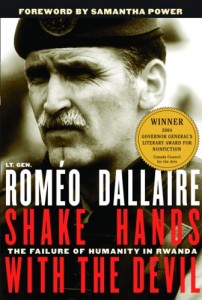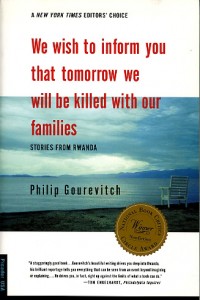Today 7th April of April is the International day for relection on Genocide in Rwanda. One of the darkest times in the history of the world. There has being a lot of narratives as regards what happened and who the key players were. The narratives in terms of external culpability is sometimes contradicting, however, we strongly recommend the following books for a holistic grasp of what happened.

Speak Rwanda; is the powerful story of ten people—Hutu and Tutsi, civilians and soldiers, mothers, politicians, and orphaned children—as they attempt to survive one of the most disturbing massacres since the Second World War; but the novel is not a story of war, instead it documents the experiences of the people who lived before, during, and after such an event. Through their individual voices we come to fully understand the moving and complex truths that existed behind our newspaper headlines.

Shake Hands with the Devil: The Failure of Humanity in Rwanda.
Review: This is a tragic and profoundly important story by legendary Canadian general who “watched as the devil took control of paradise on earth and fed on the blood of the people we were supposed to protect.” When Roméo Dallaire was called on to serve as force commander of the UN Assistance Mission for Rwanda, he believed that his assignment was to help two warring parties achieve the peace they both wanted. Instead, he was exposed to the most barbarous and chaotic display of civil war and genocide in the past decade, observing in just one hundred days the killings of more than eight hundred thousand Rwandans. With only a few troops, his own ingenuity and courage to direct his efforts, Dallaire rescued thousands, but his call for more support from the world body fell on deaf ears. In Shake Hands with the Devil, General Dallaire recreates the awful history the world community chose to ignore. He also chronicles his own progression from confident Cold Warrior to devastated UN commander, and finally to retired general struggling painfully, and publicly, to overcome posttraumatic stress disorder—the highest-ranking officer ever to share such experiences with readers.

We Wish to Inform You That Tomorrow We Will be Killed With Our Families: Stories from Rwanda.
Winner of the National Book Critics Circle Award for Nonfiction.

